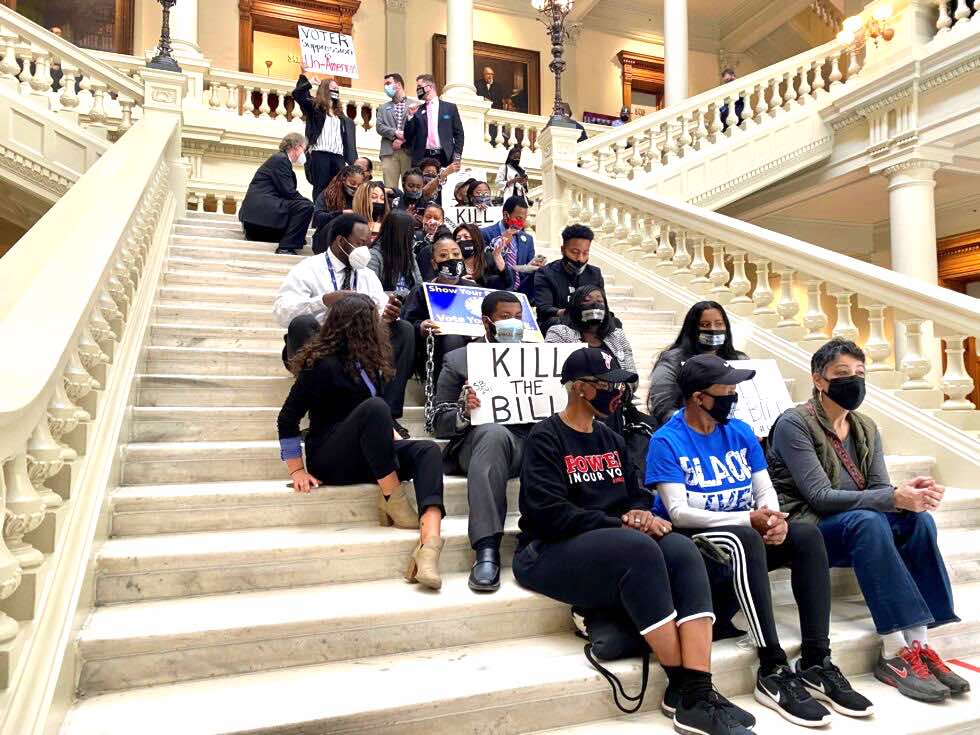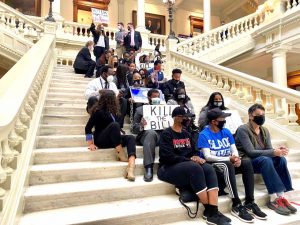ATLANTA — Controversial legislation to overhaul voting by mail in Georgia and how voters can cast early ballots is racing toward the finish line in the General Assembly amid a sharp outcry from local voting-rights and church groups.
Two bills, both proposing dozens of changes to Georgia’s election system, recently cleared major hurdles in the current legislative session and are on a collision course to final passage as top lawmakers in the state Senate and House of Representatives decide which measures to keep and which to scrap.
by Beau Evans | Mar 12, 2021 | Capitol Beat News Service, Elections
Most likely on the chopping block is a proposal to end Georgians’ ability to vote by mail without giving a reason that has drawn a loud outcry. Democratic leaders call the move an attempt by state Republicans to gut mail-in voting after absentee ballots drove historic wins in the 2020 election cycle.
Separately, church leaders and Democratic backers of former gubernatorial candidate Stacey Abrams are building up grassroots efforts to combat proposals to clamp down on line warming and weekend voting, portraying those Republican-brought measures as rooted in voter suppression.
Critics have also condemned the GOP-led election bills as attempts to curb voter turnout in Black and other minority communities that tend to lean Democratic, particularly after Black voters and mail-in ballots helped flip the presidency and both of Georgia’s two U.S. Senate seats in the 2020 elections.
“These bills are directly evil,” said Rev. Ferrell Malone Sr., the senior pastor of Macedonia Baptist Church in Waycross. “They are literally evil, and they’re coming from men and women who say they are Christians.”
Republican leaders in the House and Senate have held firm in their argument that the legislative proposals are needed to protect voter integrity in Georgia after the 2020 elections sparked doubts over the security of mail-in voting and identity verification.
Senate Majority Leader Mike Dugan, R-Carrollton, has dismissed attacks on an omnibus elections bill he is sponsoring in the Senate that includes repealing no-excuse absentee voting, as well as a new rule requiring Georgians to provide a driver’s license or state ID card number in order to request an absentee ballot.
Dugan and supporters of those measures in the Republican-controlled General Assembly also highlight the strain that processing millions of absentee ballots put on local election workers tasked with running three weeks of early voting and managing Election Day for several elections in the 2020 cycle.
“If we keep using more and more of the absentee [ballots], you’re going to overwhelm the counties multiple different ways, in the workload and the cost,” Dugan said. “The highest number of rejected ballots are mail-in absentee ballots, even with the curing process.”
“This is about [how] the method of voting in Georgia has significantly changed over the last 10 years.”
The proposal in Dugan’s bill that has come under the most criticism would limit absentee voting only to those who physically cannot go to the polls on Election Day or for early voting, ending the no-excuse absentee voting option that Republicans passed into state law in 2005.
The measure has also drawn pushback from top state Republicans including House Speaker David Ralston, R-Blue Ridge, and Lt. Gov. Geoff Duncan, who refused to preside over the Senate vote on Dugan’s bill last week in protest of the no-excuse absentee voting repeal.
Dugan has since backed off that proposal, noting that lawmakers will likely move to strip out the no-excuse absentee ban as his bill moves in the House.
“I want a good reform bill to go through,” Dugan said. “And if I’m going to get everything killed because of something that I feel is important that a majority of both chambers don’t necessarily agree with, then I’m not going to die on that hill for ego.”
It has not been settled among Republican leaders yet whether to push Dugan’s bill or a separate 66-page omnibus measure sponsored by Rep. Barry Fleming, R-Harlem, as the final set of proposals that lawmakers are expected to negotiate before passing onto Gov. Brian Kemp’s desk.
Fleming, whose office did not respond to requests for an interview for this story, has pitched several contentious changes that include requiring counties to pick either a Saturday or a Sunday for early voting and forbidding people from giving food or drinks to voters waiting in line outside polling places.
Those two proposals have prompted some of the fiercest backlash against the GOP-led elections bills by voting-rights advocates who blast them as blatant attempts to depress voter turnout in Democratic-leaning minority neighborhoods that often face long lines at polling places.
“It’s just a very cruel thing to do to people who are good Samaritans and have their faith move them to help people exercise their right to vote,” said Hillary Holley, organizing director for the group Fair Fight Action that Abrams founded following her loss to Kemp in the 2018 gubernatorial election.
“Seeing the state try to punish volunteers for helping people who are on the brink of passing out in line to vote is just horrifying.”
Abrams’ Fair Fight group, as well as local churches and other grassroots organizations, are now mobilizing to drum up widespread public opposition to state Republicans’ elections bills, including by pressuring large Georgia-based companies including Coca-Cola, Delta and Southern Company to take a stand against the bills.
Already, pressure by protesters in Southeast Georgia has spurred Hancock County officials to formally request that Fleming resign from his post as the county’s attorney on grounds that his measure is at odds with the county’s majority-Black population.
“We stand on the cusp of something great in history,” said Rev. Willie Wiley, presiding elder of the Augusta-Sparta district of the Christian Methodist Episcopal Church. “Don’t allow ambitious people who have not the interests of Georgians at heart to rob us of this unique opportunity.”
Meanwhile, Dugan says he’s weathering the storm of criticism and personal attacks his bill has inspired, while focusing on helping steer whichever set of proposals most lawmakers in the General Assembly want to see cross the finish line later this month, whether they come from Fleming’s bill or his own.
“My concern is really not the politics of it,” Dugan said. “My concern is actually having something that is beneficial for the state moving forward.” — Capitol Beat News Service












Leave a Comment
You must be logged in to post a comment.